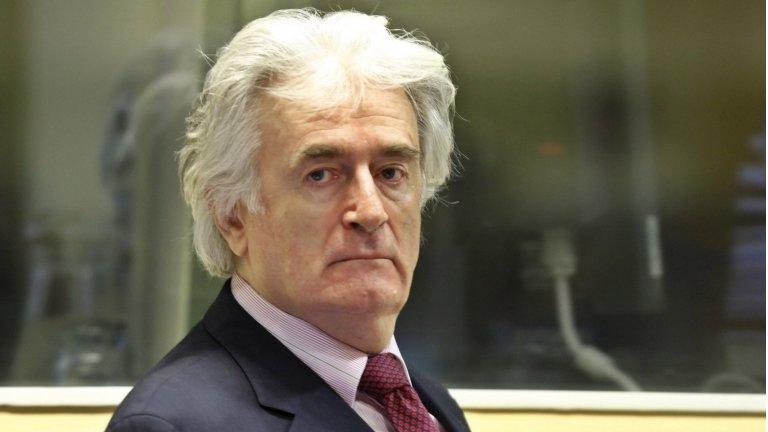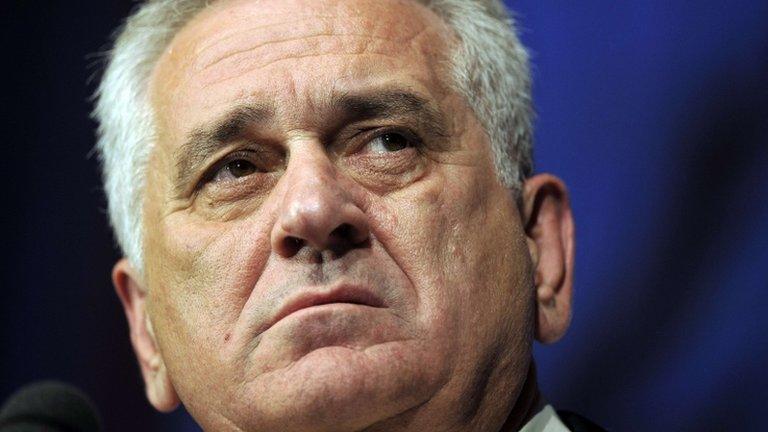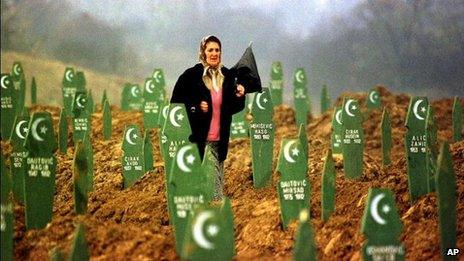Karadzic genocide charge reinstated
- Published
Judge Theodor Meron said: "Karadzic's argument...is rejected"
A genocide charge against former Bosnian Serb leader Radovan Karadzic has been reinstated at the UN Yugoslav war crimes tribunal in The Hague.
The count of genocide, external relates to a campaign of killing and mistreating non-Serbs in seven municipalities at the start of the Bosnian war in 1992.
The ruling means he now faces 11 charges, including a further charge of genocide for the Srebrenica massacre.
More than 7,500 Muslim men and boys died in the enclave in July 1995.
It was the worst atrocity in Europe since the end of World War II.
The tribunal's decision was passed as thousands of people gathered in the Bosnian town of Srebrenica for the burial of more than 400 newly-identified victims of the 1995 massacre.
'Genocidal intent'
Prior to Thursday's ruling, Mr Karadzic had been on trial for 10 charges of genocide, war crimes and crimes against humanity.
They include allegations that he orchestrated the shelling of Sarajevo, and the use of 284 UN peacekeepers as human shields in May and June 1995.
The additional charge of genocide had been brought against him over a campaign to drive hundreds of thousands of Bosnian Muslims (also known as Bosniaks) and Croats out of large parts of Bosnia at the start of the three-year war.
It was dismissed by judges in June last year for lack of evidence.
But appeals judges now believe evidence presented by the prosecution "could indicate that Karadzic possessed genocidal intent" against Muslims and Croats, Judge Theodor Meron said on Thursday.
"The Appeals Chamber finds that the Trial Chamber erred in fact in concluding that there was no evidence", Mr Meron said, adding that the decision "resulted in a miscarriage of justice".
The former Bosnian Serb leader was arrested in Belgrade in 2008 after 13 years on the run.
He had been found living in disguise in Belgrade, under a false name and working as a New Age healer. A bushy grey beard and thick glasses had transformed his appearance.
When Bosnia-Hercegovina became in independent state in 1992, Mr Karadzic declared the creation of the independent Serbian Republic of Bosnia and Hercegovina (renamed Republika Srpska) with its capital in Pale, a suburb of Sarajevo, and himself as head of state.
His party, supported by Serbian then-President Slobodan Milosevic, organised Serbs to fight against the Bosniaks and Croats in Bosnia.
A vicious war ensued, in which Serbs besieged Sarajevo for 44 months, shelling Muslim forces but also terrorising the civilian population with a relentless bombardment and sniper fire. Thousands of civilians died, many of them deliberately targeted.
Bosnian Serb forces - assisted by paramilitaries from Serbia proper - also expelled hundreds of thousands of Muslims and Croats from their homes in a brutal campaign of "ethnic cleansing". Numerous atrocities were documented, including the widespread rape of Bosniak women and girls.
- Published24 March 2016

- Published25 April 2013

- Published19 June 2013
